1979
The novelisation of The Hitch-Hiker’s Guide to the Galaxy came out in 1979, just a smidge before I was born. There’s a well-known scene in the second chapter featuring Ford Prefect, an alien living on Earth, distracting his human friend Arthur Dent. Arthur is concerned about the imminent demolition of his house by a wrecking crew, and Ford takes him to the pub to get him drunk, in anticipation of the pair attempting to hitch a lift on an orbiting spacecraft that’s about to destroy the planet:
“Six pints of bitter,” said Ford Prefect to the barman of the Horse and Groom. “And quickly please, the world’s about to end.”
The barman of the Horse and Groom didn’t deserve this sort of treatment, he was a dignified old man. He pushed his glasses up his nose and blinked at Ford Prefect. Ford ignored him and stared out of the window, so the barman looked instead at Arthur who shrugged helplessly and said nothing.
So the barman said, “Oh yes sir? Nice weather for it,” and started pulling pints.
He tried again.
“Going to watch the match this afternoon then?”
Ford glanced round at him.
“No, no point,” he said, and looked back out of the window.
“What’s that, foregone conclusion then you reckon sir?” said the barman. “Arsenal without a chance?”
“No, no,” said Ford, “it’s just that the world’s about to end.”
“Oh yes sir, so you said,” said the barman, looking over his glasses this time at Arthur. “Lucky escape for Arsenal if it did.”
Ford looked back at him, genuinely surprised.
“No, not really,” he said. He frowned.
The barman breathed in heavily. “There you are sir, six pints,” he said.
Arthur smiled at him wanly and shrugged again. He turned and smiled wanly at the rest of the pub just in case any of them had heard what was going on.
None of them had, and none of them could understand what he was smiling at them for.
A man sitting next to Ford at the bar looked at the two men, looked at the six pints, did a swift burst of mental arithmetic, arrived at an answer he liked and grinned a stupid hopeful grin at them.
“Get off,” said Ford, “They’re ours,” giving him a look that would have an Algolian Suntiger get on with what it was doing.
Ford slapped a five-pound note on the bar. He said, “Keep the change.”
“What, from a fiver? Thank you sir.”
There’s a few great jokes there, but I’m interested in the final line. Ford buys six pints of bitter, pays with a five-pound note, and says “keep the change”, which surprises the barman. Presumably this is as a result of Ford’s perceived generosity… though of course what’s really happening is that Ford has no use for Earth money any longer; this point is hammered home for the barman and nearby patrons when Ford later buys four packets of peanuts, also asking the barman to keep the change from a fiver.
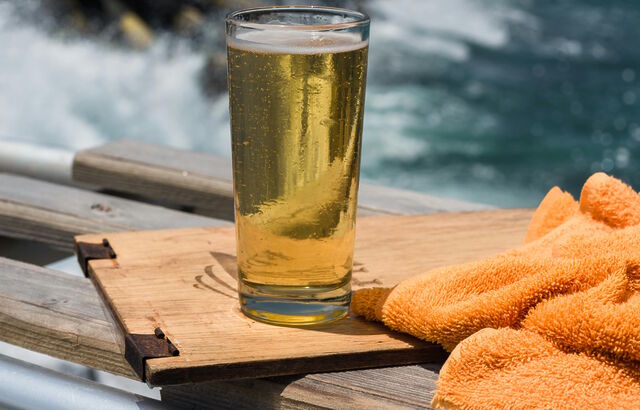
We’re never told exactly what the barman would have charged Ford. But looking at the history of average UK beer prices and assuming that the story is set in 1979, we can assume that the pints will have been around 34p each1, so around £2.04 for six of them. So… Ford left a 194% tip for the beer2.
1990
By the time I first read Hitch-Hikers, around 1990, this joke was already dated. By then, an average pint of bitter would set you back £1.10. I didn’t have a good awareness of that, being as I was well-underage to be buying myself alcohol! But I clearly had enough of an awareness that my dad took the time to explain the joke… that is, to point out that when the story was written (and is presumably set), six pints would cost less than half of five pounds.
But by the mid-nineties, when I’d found a friend group who were also familiar with the Hitch-Hikers… series, we’d joke about it. Like pointing out that by then if you told the barman to keep the change from £5 after buying six pints, the reason he’d express surprise wouldn’t be because you’d overpaid…
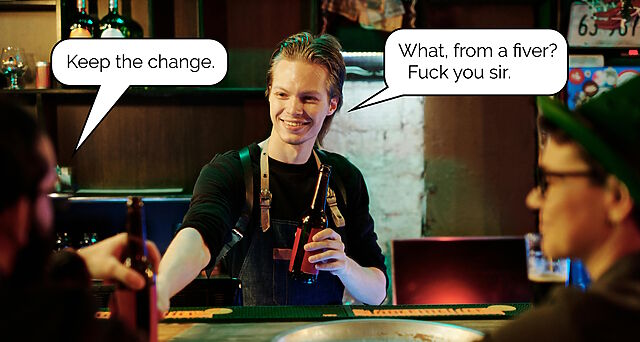
1998
Precocious drinker that I was, by the late nineties I was quite aware of the (financial) cost of drinking.
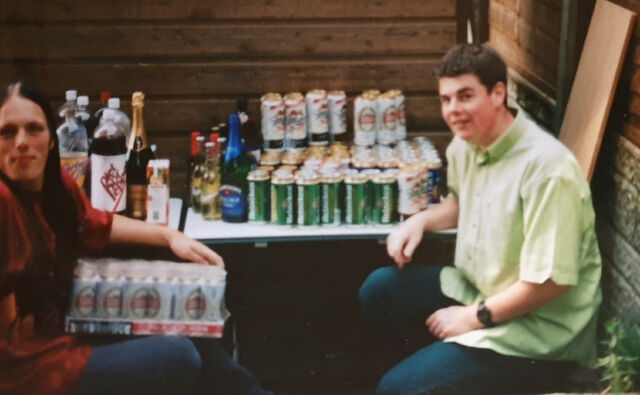
And so when it was announced that a new denomination of coin – the £2 coin – would enter general circulation3 I was pleased to announce how sporting it was of the government to release a “beer token”.
With the average pint of beer at the time costing around £1.90 and a still cash-dominated economy, the “beer token” was perfect! And in my case, it lasted: the bars I was drinking at in the late 1990s were in the impoverished North, and were soon replaced with studenty bars on the West coast of Wales, both of which allowed the price of a pint to do battle with inflationary forces for longer than might have been expected elsewhere in the country. The “beer token” that was the £2 coin was a joke that kept on giving for some time.
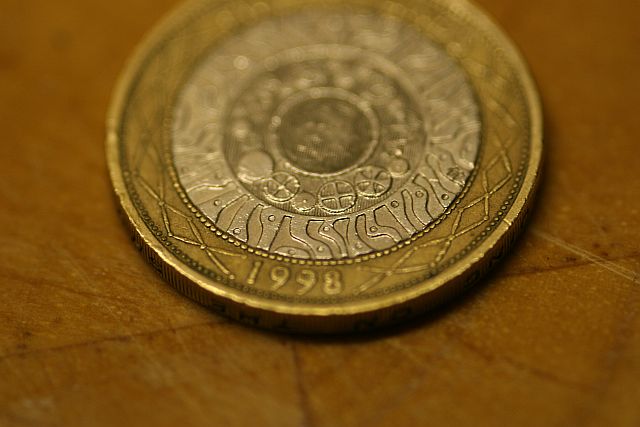
2023
As the cost of living rapidly increased circa 2023, the average price of a pint of beer in the UK finally got to the point where, rounded to the nearest whole pound, it was closer to £5 than it is to £44.
And while we could moan and complain about how much things cost nowadays, I’d prefer to see this as an opportunity. An opportunity for a new beer token: a general-release of the £5 coin. We already some defined characteristics that fit: a large, heavy coin, about twice the weight of the £2 coin, with a copper/nickel lustre and struck from engravings with thick, clear lines.
And the design basically comes up with itself. I give you… the Beer Token of the 2020s:
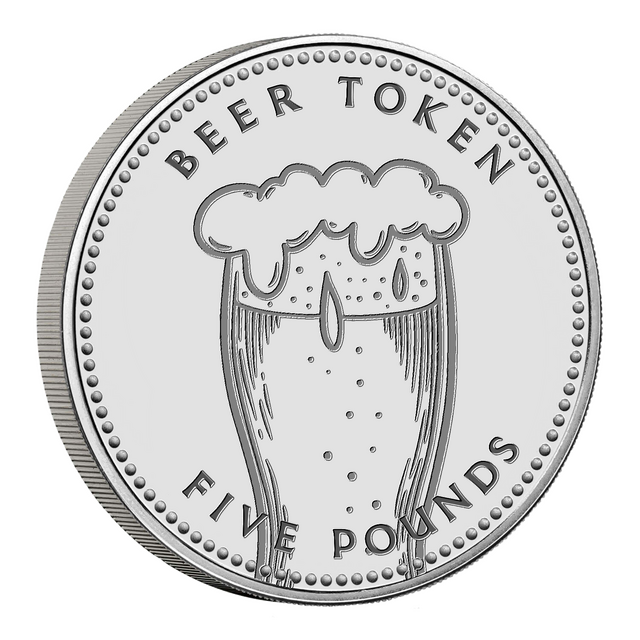
It’s time for the beer token to return, in the form of the £5 coin. Now is the time… now is the last time, probably… before cash becomes such a rarity that little thought is evermore given to the intersection of its design and utility. And compared to a coin that celebrates industry while simultaneously representing a disfunctional machine, this is a coin that Brits could actually be proud of. It’s a coin that tourists would love to take home with them, creating a satisfying new level of demand for the sinking British Pound that might, just might, prop up the economy a little, just as here at home they support those who prop up the bar.
I know there must be a politician out there who’s ready to stand up and call for this new coin. My only fear is that it’s Nigel Fucking Farage… at which point I’d be morally compelled to reject my own proposal.
But for now, I think I’ll have another drink.
Footnotes
1 The recession of the 1970s brought high inflation that caused the price of beer to rocket, pretty much tripling in price over the course of the decade. Probably Douglas Adams didn’t anticipate that it’d more-than-double again over the course of the 1980s before finally slowing down somewhat… at least until tax changes in 2003 and the aftermath of the 2022 inflation rate spike!
2 We do know that the four packets of peanuts Ford bought later were priced at 7p each, so his tip on that transaction was a massive 1,686%: little wonder the barman suddenly started taking more-seriously Ford’s claims about the imminent end of the world!
3 There were commemorative £2 coins of a monometallic design floating around already, of course, but – being collectible – these weren’t usually found in circulation, so I’m ignoring them.
4 Otherwise known as “two beer tokens”, of course. As in “Bloody hell, 2022, why does a pint of draught cost two beer tokens now?”
Also available:
on YouTube
on Facebook
as a blog post or a podcast episode
Read more →